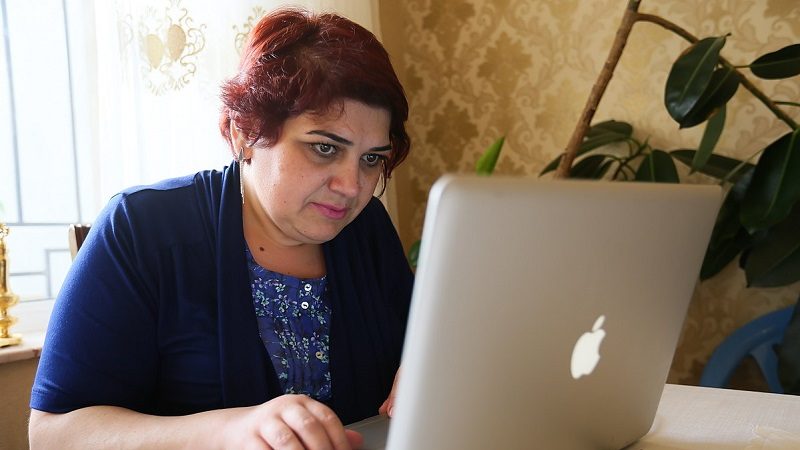The European Court of Human Rights has today ruled that the authorities in Azerbaijan failed to investigate serious invasions of privacy of investigative journalist Khadija Ismayilova.
The court found ruled against the authorities, finding them guilty of two violations of Article 8 (the right to respect for private and family life, home and correspondence) of the European Convention on Human Rights and one Violation of Article 10 (freedom of expression) of the same convention.
Ismayilova brought the case to the Court’s attention after she had been sent a letter in 2012 that threatened “public humiliation” if she did not cease her work as an investigative journalist.
The note she received was accompanied by stills lifted from a video of her and her then boyfriend having sexual intercourse. The note read: “Whore, refrain from what you are doing, otherwise you will be shamed”.
When she continued, undeterred, a video of a sexual nature filmed without her knowledge or consent was released and posted on the internet, shortly followed by another two. She then discovered that her apartment was bugged with a number of hidden cameras that were used to track her every move.
The Court found that the State had failed to adhere to their duty to investigate the crime committed against Ismayilova and that they had failed to act on significant leads in the case.
One lead in particular concerned a telephone engineer from the State-owned telecommunications company Baktelekom, yet there had been no investigation into any possible links between her vocal criticism of the government and the acts committed against her.
Ismayilova is widely considered as Azerbaijan’s most exceptional investigative journalists. Over the last 10 years she has exposed numerous instances of corruption, illegality and human rights abuses in the highest levels of the country’s regime.
Her work has also exposed how the country’s money has been misappropriated and funneled abroad to pay off European politicians and finance corrupt deals. During the course of her work, she has been subjected to travel bans, harassment, smear campaigns and false criminal charges. She continues to work, despite serving 18 months in prison.
In December 2014, she was arrested on spurious charges of inciting a person to attempt suicide and was sentenced to seven and a half years in prison under additional charges of embezzlement, illegal business, abuse of power, and misappropriation after the court acquitted her of the original charge of inciting suicide.
Then in May 2016 she was released on probation with three and a half years still to serve, a ban on continuing her work as a journalist, and a travel ban. Then on 30 January last year, the Baku Court of Appeal ruled to uphold the ban, stopping Ismaylova from travelling to Sweden to receive an award in recognition of her work as a human rights activist.
While the judgment from the ECHR stated that it “had not been possible to establish beyond reasonable doubt that the State itself had been responsible for the very serious invasion of Ms Ismayilova’s privacy,” it did acknowledge that there had been “significant flaws and delays in the manner in which the authorities had investigated the case”, resulting in violations of her human rights.
The Court took note of the fact that the threatening letter received by Ismayilova had been related to her professional journalistic activity. It also had regard to reports on the general situation in Azerbaijan concerning journalists, notably their alleged persecution, including actual physical
attacks, and the perceived climate of impunity for those responsible.
In such a situation, the State had not just been required to take measures to protect her from intrusion into her private life, but also had a duty under Article 10 of the Convention to protect her freedom of expression.
The Court found the criminal investigation had been flawed and delayed, and the situation had been compounded by the articles published in allegedly pro-government newspapers and the authorities publicly disclosing information relating to her private life for no apparent reason. That had been contrary to the spirit of an environment protective of journalism.












